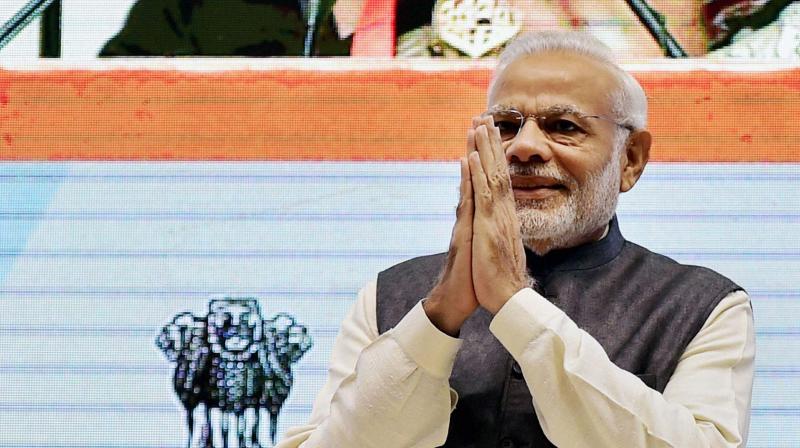Reflections: Dark days ahead if State backs bigotry

No one will hold Narendra Modi or Rajnath Singh directly responsible for a 24-year-old dalit youth, Mahesh Parmar, who gave his moustache a swashbuckling twirl, being thrashed in a Gujarat village, together with his brother and 72-year-old grandmother. Prime Ministers and home ministers are not even expected to be aware of such trivialities in remote areas. In fact, the Madras high court once ruled in the face of evidence to the contrary that the landlords accused of setting fire to a Harijan (as dalits were then called) village and burning to death over 40 men, women and children had to be innocent as people of their stature could not possibly commit such a heinous crime. They would engage others to do their dirty work for them. But example can be as compelling as instructions. Britain’s Brexit vote, for instance, was followed by what Sir Bernard Hogan-Howe, London’s Metropolitan Police commissioner, calls a “horrible spike in hate crimes”, including the murder of a Polish man. The attacks seemed to target East Europeans.
Similarly, the United States suffered increasing incidents of racist or anti-Semitic vandalism and violence after Donald Trump’s election, many drawing directly on his rhetoric. “The white supremacists out there are celebrating his victory and many are feeling their oats,” Richard Cohen, president of the Southern Poverty Law Centre. Tracey Henley, a parish administrator, was quoted in Time magazine as saying “people now feel free to say racist things that they wouldn’t have said before” because “a racist bigot” had been elected President. When Britain’s first Race Relations Act was passed in 1965, I asked an English community worker if the courts would be able (and willing) to handle a slew of prosecutions. Since the law outlawed discrimination on “grounds of colour, race, or ethnic or national origin”, any landlady who turned away an Irish tenant, any business that wouldn’t hire an Indian, or any restaurant that refused to serve a Jamaican became vulnerable to prosecution.
My friend answered that by and large, the British were a law-abiding nation and respected the authority of the state. If the state forbade discrimination, people would obey irrespective of their private feelings. The surge in race crimes since Brexit confirms that assessment. The violence London’s police chief mentions reminds us that ordinary folk follow the leader. In the popular perception, the political leadership is taking Britain out of the European Union because it doesn’t want to be overrun by EU citizens. No one contradicted the boast by Nigel Farage of the far-right United Kingdom Independence Party that anti-European immigration feeling triggered the vote. In consequence, the British feel that attacks on Poles, Estonians, Croatians and other EU citizens will be condoned. It’s pointed out that unlike in previous race friction, no one has attacked Asian, African or Caribbean immigrants this time.
Similar factors may be at work in India too. Of course, Mr Modi or Rajnath Singh do not explicitly encourage the victimisation of dalits. But a clear message went out on December 15 when the Union home ministry reportedly blocked the Navsarjan Trust’s entitlement to receive donations from abroad for its social welfare activities under the Foreign Contribution Regulation Act. Founded in 1989, Navsarjan is Gujarat’s oldest and most effective dalit rights organisation. Its right legally to receive and utilise foreign funds was renewed as recently as August 3. The home ministry now says this sanction was inadvertently granted and that Navsarjan’s licence is being revoked in the “public interest” because of its involvement in “undesirable activities aimed to affect prejudicially harmony between religious, racial, social, linguistic, regional groups, castes or communities”.
An explanation for this action may be found in the protests that Navsarjan spearheaded in July this year when four dalit tanners were reportedly stripped naked, beaten with iron pipes and rods, tied to an SUV and paraded in the marketplace. Their crime was to skin the carcass of a dead cow in a village near Una town, also in Gujarat. Their attackers were believed to be Gau Raksha Samiti activists, members of a “self-styled” cow vigilante group, according to Amarinder Singh, the former Punjab chief minister. Mr Singh took Mr Modi sharply to task for his “silence” on the outrage. “There appears to be a dangerous pattern behind the incidents of verbal and physical abuse and violence on dalits everywhere which are either ignored or encouraged at the peril of sparking off a caste war,” he alleged. Given the BJP’s cultural orientation, organisations like the Gau Raksha Samiti feel entitled to bask in official favour. There are also suspicions that cancelling foreign funding is a weapon of demonstrating official disapproval.
In June the government put curbs on the right of Teesta Setalvad’s Sabrang Trust, which has been litigating on behalf of victims of the 2002 Gujarat riots, to receive money from foreign well-wishers. Then the axe fell on Lawyers’ Collective, whose founder Indira Jaising represented Ms Setalvad in the case against Sabrang. Now, it is Navsarjan which has been campaigning against untouchability in Gujarat, demanding minimum wages for all agricultural labourers irrespective of caste, and celebrating Bhimrao Ambedkar’s work with plans for a massive statue. The reprisal because Mahesh Parmar dared to twirl his moustache in the presence of his caste superiors is a straw in the wind of a bleak and intolerant future. But Mr Modi can still redeem himself. Media reports indicate that Navsarjan has not yet received the order banning foreign funding. Mr Rajnath Singh can cancel or revoke it. That would offer some hope of reprieve for a country that seems to regress into the dark ages while state power backs social and cultural bigotry.

